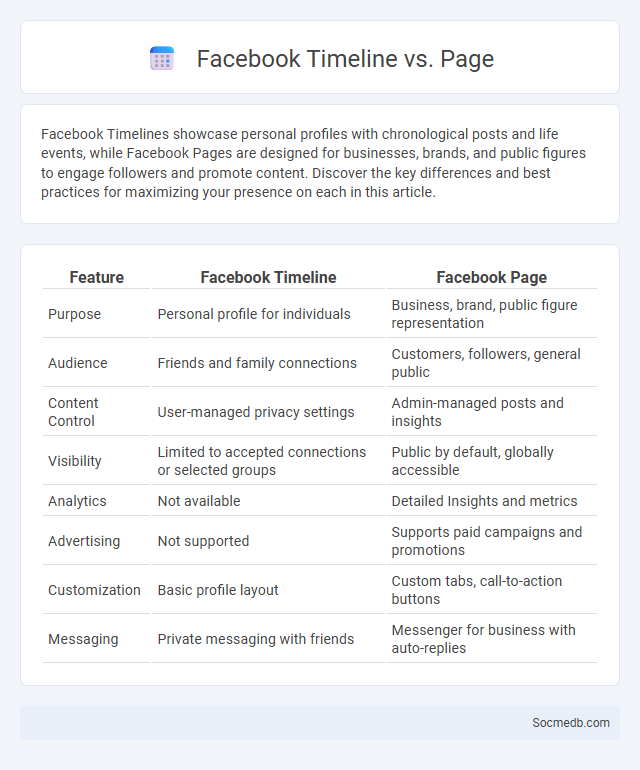
Photo illustration: Facebook Timeline vs Page
Facebook Timelines showcase personal profiles with chronological posts and life events, while Facebook Pages are designed for businesses, brands, and public figures to engage followers and promote content. Discover the key differences and best practices for maximizing your presence on each in this article.
Table of Comparison
| Feature | Facebook Timeline | Facebook Page |
|---|---|---|
| Purpose | Personal profile for individuals | Business, brand, public figure representation |
| Audience | Friends and family connections | Customers, followers, general public |
| Content Control | User-managed privacy settings | Admin-managed posts and insights |
| Visibility | Limited to accepted connections or selected groups | Public by default, globally accessible |
| Analytics | Not available | Detailed Insights and metrics |
| Advertising | Not supported | Supports paid campaigns and promotions |
| Customization | Basic profile layout | Custom tabs, call-to-action buttons |
| Messaging | Private messaging with friends | Messenger for business with auto-replies |
Introduction to Facebook Timeline and Page
Facebook Timeline offers a dynamic way for users to showcase their personal stories, photos, and life events in chronological order, enhancing social interaction and personal branding. Pages on Facebook serve businesses, brands, and public figures by providing a dedicated platform to engage followers, share updates, and promote content effectively. Utilizing Timeline and Pages strategically boosts visibility, audience engagement, and overall social media presence.
Key Differences Between Timeline and Page
A timeline on social media displays posts and interactions chronologically, providing a personal narrative of Your activity and updates. A page, often used by businesses or public figures, serves as a hub for brand promotion, featuring curated content, contact information, and audience engagement tools. Timelines prioritize individual expression and social connections while pages emphasize marketing, community building, and analytics.
Main Features of Facebook Timeline
Facebook Timeline offers a dynamic way for you to showcase life events, photos, and posts in chronological order, making it easy to revisit memories. Key features include the Cover Photo for personalized branding, the Highlighted Posts that draw attention to significant updates, and the Ability to Filter Content by year or event for streamlined navigation. The Timeline's interactive design enhances social connectivity by allowing friends to engage through likes, comments, and shared posts directly on your profile.
Primary Functions of Facebook Page
Facebook Pages serve as a vital platform for businesses and public figures to establish an online presence and engage with audiences. Key functions include content sharing, direct communication through comments and messages, event promotion, and analytics for tracking user engagement and demographics. These features enable targeted marketing strategies and foster community building around brands or causes.
Timeline vs Page: Target Audience Comparison
A social media Timeline primarily targets individual audiences by showcasing personal updates, photos, and interactions tailored to your connections or followers, fostering direct engagement and real-time communication. Pages are designed for businesses, brands, or public figures aiming to reach a broader, more diverse demographic through curated content, promotions, and targeted advertising. Understanding these differences helps you tailor your strategy to maximize reach and engagement with the appropriate audience.
Content Management: Timeline vs Page
Content management on social media requires understanding the differences between Timeline and Page formats to effectively engage your audience. A Timeline allows you to share personalized updates and memories that display chronologically, ideal for individual storytelling and interaction. In contrast, a Page is designed for businesses and brands, offering tools for promotions, analytics, and audience targeting to maximize your reach and impact.
Engagement and Interaction Differences
Social media platforms vary significantly in engagement and interaction styles, with Instagram emphasizing visual content like images and short videos to foster immediate user reactions, while Twitter prioritizes real-time text updates and conversations through retweets and replies. Facebook combines multimedia sharing with extensive comment threads and group interactions that encourage deeper community involvement. Understanding these differences helps you tailor your content strategy to maximize user engagement and meaningful interactions on each platform.
Privacy and Visibility Settings
Social media platforms offer various privacy and visibility settings that allow you to control who can see your profile, posts, and personal information. Adjusting these settings helps protect your data from unauthorized access and limits exposure to unwanted audiences. Regularly reviewing and customizing these options ensures that your online presence aligns with your privacy preferences and personal security.
Best Use Cases: When to Choose Timeline or Page
Timelines are ideal for personal storytelling, real-time updates, and fostering interactive conversations with followers through chronological posts. Pages are best suited for businesses and brands seeking to showcase products, share official announcements, and engage customers with targeted content and advertising. Selecting between timeline and page depends on the goal: personal engagement favors timelines, while professional branding benefits from pages.
Final Verdict: Facebook Timeline vs Page
Your choice between a Facebook Timeline and a Page depends on your goals; Timelines are ideal for personal interactions and sharing life updates, while Pages are designed for businesses, brands, and public figures seeking professional engagement and analytics. Pages offer advanced tools such as Facebook Insights, targeted advertising, and enhanced visibility to reach a broader audience effectively. For marketing and brand development, a Facebook Page provides better scalability and data-driven strategies compared to the limited features of a Timeline.
 socmedb.com
socmedb.com